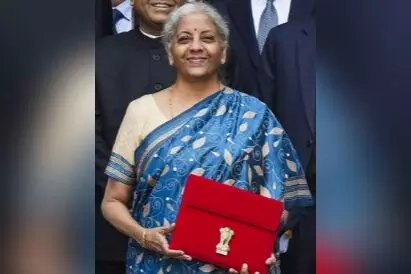Sitharaman to present sixth Budget in a row ahead of general elections
Narendra Modi government's last Budget before the general elections is widely expected to contain a mix of measures for the economy and electorally significant segments like farmers and women.
By Newsmeter Network
New Delhi: Finance Minister Nirmala Sitharaman will present her sixth straight Budget ahead of the Parliamentary elections, matching the record of former Prime Minister Morarji Desai.
Sitharaman in her pre-election Budget, which technically is a vote on account and popularly termed an interim Budget, will seek Parliament's nod for a grant in advance to meet the central government's essential expenditure for the first four months of the new fiscal year that starts in April. A new government elected after the April/May general elections will present the full Budget, likely in July.
Prime Minister Narendra Modi government's last Budget before the general elections is widely expected to contain a mix of measures for the economy and electorally significant segments like farmers and women.
Peppered with political statements, it may be a political document with a snapshot of the Modi government's triumphs over the last 10 years and pointers to how it wants to take the country forward.
With pressure for populist measures off after recent emphatic wins in three states, including Madhya Pradesh and Rajasthan, Sitharaman is expected to stick to being fiscally prudent while sprinkling sops for sectors like agriculture and engines of the economy that would create jobs and boost consumption.
While convention dictates that no major policy announcements are made in the interim Budget, it however, presents an occasion for spectacle just weeks ahead of the Model Code of Conduct coming into force for the general elections.
Some finance ministers in the past have used the occasion to announce doles for rural India and the middle class.
For instance, the then Finance Minister Piyush Goyal in his interim Budget in 2019 had announced Rs 75,000 crore outlay for PM KISAN Samman Nidhi scheme wherein farmers are paid Rs 6,000 cash a year.
He also raised standard deduction to Rs 50,000, and came up with tax rebate to ensure that individuals with income of up to Rs 7 lakh per annum are not taxed.
In the pre-election Budget of 2014, Finance Minister P Chidambaram in the Congress-led UPA government slashed excise duty on cars, SUVs, two wheelers, capital goods and consumer durables to boost manufacturing.
Pranab Mukherjee too in his interim Budget in 2009 hiked the outlay for rural sector schemes to shield economy from the aftermath of global financial crisis triggered by collapse of US-based investment bank Lehman Brothers in 2008.
Jaswant Singh of the BJP-led NDA government in the 2004 pre-election interim Budget announced sops for central government employees.
The first interim Budget of independent India was presented by the then Finance Minister R K Shanmukham Chetty on November 26, 1947. C D Deshmukh presented the interim Budget in 1952, TT Krishnamachari in 1957.
Former Prime Minister Morarji Desai presented two interim Budgets, one in 1962 and other in 1967. Desai has the distinction of presenting six Budgets in a row. He had presented a total number of 10 Union Budgets.
Among others, Manmohan Singh presented interim Budget in 1996, Yashwant Sinha in 1991, R Venkataraman in 1980, H M Patel in 1977, and Y B Chavan in 1971.
As the Parliamentary elections are due, Sitharaman's interim Budget may not contain any major policy changes.
Speaking at an industry event in December 2023, Sitharaman had ruled out any "spectacular announcement" in the interim Budget, saying it would just be a vote-on-account before the general elections.
After the Modi government came to power in 2014, Arun Jaitley took charge of the finance ministry and presented five Budgets in a row from 2014-15 to 2018-19. It was in 2017 that Jaitley departed from the colonial-era tradition of presenting Budget on the last working day of February to 1st of the month.
After the 2019 general elections, in the Modi 2.0 government, Sitharaman was given the charge of the finance portfolio. She became the second woman to have presented Budget after Indira Gandhi, who had presented the Budget for financial year 1970-71.
In 2019, Sitharaman did away with the traditional Budget briefcase and instead went for a 'bahi-khata' with the national emblem to carry the speech and other documents.
Under Sitharaman, India has weathered the Covid pandemic with an array of policy measures announced for the poor and continued its tag of the fastest growing major economy and a 'bright spot' in the world economy.
India is racing to become a USD 5 trillion economy by 2027-28 and a USD 30 trillion by 2047.
Sitharaman is expected to come up with some measures, especially to boost the rural sector as the agriculture sector growth in 2023-24 is estimated to decelerate to 1.8 per cent, from 4 per cent in the preceding year